Development Alternatives launched the first Mother Portal - TARAhaat.com - for rural areas in the Third World to connect the
rural India to the Global village. It was initiated with the idea of using internet and other information technologies in local languages.
Whether it is weather forecasts or current commodity prices, educational opportunities, government schemes, matrimonial and horoscopes, medical or career advice for just a few rupees worth on net connectivity, the villager can now have easy access to all the latest information from around the world. TARAhaat was set up on the premise that knowledge brings options, options create opportunities and opportunities lead to sustainable development.
TARAhaat operates through franchised business-cum-community centres called TARAkendras. It has kendras in Bundelkhand in Central India and Bhatinda district in Punjab.
Given below are a few success stories from Bundelkhand that prove that Information and Communications Technology (ICT) could be deployed to further the overall mission of Development Alternatives, which is to create sustainable livelihoods in large numbers.
| Bundelkhand's Shining Stars |
Shaila
S
hailaís hunger for knowledge and her warm personality were noticed by TARAhaat and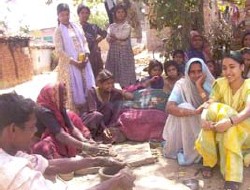
at nineteen she is a Basic IT and Practical English Course instructor.
A resident of Niwari block of Tikamgarh, Shaila Srivastava has achieved what girls in peri-urban India can only dream of Today, this 19 year old girl is successfully employed and standing on her own feet.
Life changed for Shaila when TARAhaat opened its centre at Niwari. She joined the BIT course there. Her intelligence and commitment helped her complete the course faster than other students. Her drive and initiative caught the attention of the instructors and TARAhaat offered her an instructorís position when she had finished her course.
She was also selected for the challenging job of the Soochak for TARAhaatís e-governance project in Tikamgarh district.
As a Soochak, she had to act as a coordinator between the block officers and rural customers, mostly women. She was instrumental in defining the success of the project.
But Shaila was not a person who would rest peacefully on past laurels. She continued her studies with a DIT course from the Niwari TARAkendra, while continuing to work as an instructor.
"TARAhaat has changed my life in a big way." says Shaila. No doubt, her newfound belief is reflected in her attitude. She is now living away from her parents and commuting to the Niwari and TARAgram centres where she provides PEC and BIT training. This is only the beginning. q
Pramod Sharma
Pramod has come a long way from the boy who has worked
pretty hard to secure a government job. He has completed TARAhaatís Basic
IT course and is now pursuing advanced computer courses at the local
TARAkendra.
His BIT certificate has helped him get a job at the local school,
Saraswati Sishu Mandir. He now realizes that a government job is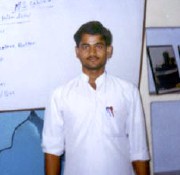 not the only option available to rural youth.
not the only option available to rural youth.
Pramod is one among the many beneficiaries of TARAhaat. The quality IT and
non-IT education that TARAhaat provides has enabled many rural students in
to look at their future with optimism.
Having heard about TARAhaat and its education courses from his friends, he
registered for the BIT course. His hard work and determination finally
paid off as he turned Ďcomputer friendlyí in no time.
Although Pramod Sharma still considers a job in the government sector as a
security belt, he is not hesitant in exploring other careers. With him
taking the initiative as a computer teacher, he is now confident that
there are other options as well that are available to him and his friends.
Parmar Sisters
The Parmar sisters, Pinky,
Rajmani and Priti, never dreamed that their photographs would appear on
the cover of Business World one day. But truth is stranger than fiction.
People from around the world now come to Punavali Kalan, a remote village
located 17 km from Jhansi in Uttar Pradesh, to meet these three spirited
sisters.
Pinky, the eldest and a born leader, had always been an active social
worker. She spearheaded DAís Swajal project (aided by World Bank) aimed at
providing safe drinking water in the Bundelkhand region, one of the
poorest areas in the country. She inspired her sister Rajmani to open a
TARAkendra in their village. Rajmani, a good student, was pursuing her
Masters in Sociology from the University of Bundelkhand, Jhansi. She had
also completed a basic course in computers. Energetic and gifted with rare
entrepreneurial skills, Rajmani visualised a future wherein the TARAkendra
would become the centre of attraction in the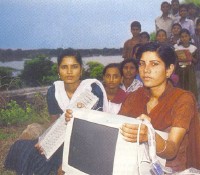 entire region. And, her dream was realized when people from the media
thronged their village to witness first hand the revolution brought upon
by the sisters. Rajmani now handles the administrative functions of the
TARAkrendra and also teaches the Basic IT course.
entire region. And, her dream was realized when people from the media
thronged their village to witness first hand the revolution brought upon
by the sisters. Rajmani now handles the administrative functions of the
TARAkrendra and also teaches the Basic IT course.
The youngest sister, Priti, was apprehensive at the beginning. However,
she soon realized that she could also join the global community and enjoy
the facilities that technology provides to people across the world. She
went on to enroll for a BIT course to strengthen her career prospects.
Priti also helps her neighbours find information, especially on various
kinds of common diseases. Nowadays, she helps her sisters run the
TARAkendra and also helps her teach the younger students.
The Parmar sisters believe that the most important contribution TARAhaat
has made in their lives is to encourage them to dream. They now dream that
there will be a TARAkendra in even the remotest village of India, and that
would help many others to dream.
Ripudaman Singh
Ripudaman Singh of Dabra village in the Bundelkhand
region of Madhya Pradesh dreamt of doing something other than agriculture,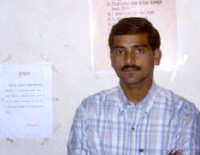 the profession followed by previous generations. With this aim, he
completed his Bachelorís degree in Commerce and started pursuing his
Masters degree. He was still unsure of how this would help him establish
himself. He knew he could not afford to move to a big city for better
prospects.
the profession followed by previous generations. With this aim, he
completed his Bachelorís degree in Commerce and started pursuing his
Masters degree. He was still unsure of how this would help him establish
himself. He knew he could not afford to move to a big city for better
prospects.
All this, however, was before he joined TARAhaat for the Basic IT course.
It opened a whole new world for him. On the successful completion of the
course, he got a job as a computer teacher in Rao Purendra Convent School
at Dabra. He has now registered his younger brother also for the Basic IT
course at the local TARAkendra.
Ripudamanís words sum it all -"TARAhaatís education has changed my entire
way of thinking. Iím much more confident and positive than ever before."
Dilip Shrivastava
Dilip Srivastava never ever
believed that he would be one of the success stories of the silent
revolution that is changing the face of rural India. Like any other young
man from a typical rural family, Dilip was more conscious of his
limitations rather than opportunities.
Dilip belongs to the Datia district in Bundelkhand region, which is the
second poorest region in India after Kalahandi in Orissa. Almost all the
young boys and girls of Dabra village in Datia district of Madhya Pradesh
share the same story.
In an environment where mere survival is an uphill task, education is
really a luxury. Parents are unable to afford to provide their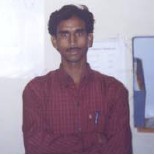 children the higher education that is essential for acquiring a steady
job.
children the higher education that is essential for acquiring a steady
job.
A farmer by profession, Dilipís father had to toil day in and day out
merely to make both ends meet. His meagre income was hardly sufficient to
meet the basic necessities of his eight children, with education always
taking a back-seat.
In spite of his hard earned B.Com degree, Dilip did not have any
opportunity to acquire a job with a decent salary to supplement his
fatherís income.
Life suddenly took a positive turn when one of Dilipís friends informed
him about
He enrolled himself for a TARAhaat computer course in a bid to improve his job prospects. On successfully completing the Basic IT course at TARAhaat, his efforts were rewarded as he finally got a job as a computer instructor at the IPS Inter College, Dabra.
Dilip is now not only helping his father take care of the entire family, but has also enrolled for other courses to improve his job prospects. q